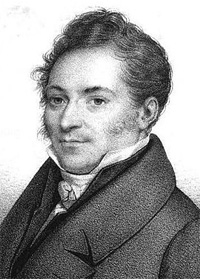| Profile | Major Works | Resources |
Étienne Cabet, 1788-1856

Originally from Dijon (Burgundy), the son of a cooper, Étienne Cabet managed nonetheless to acquire an education to become a teacher. He went on to study medicine before abandoning it for law. Entering practice in Dijon, Cabet acquired a effective reputation as a lawyer, and by 1825 had moved to Paris. He soon fell in with the republican circles around Dupont de l'Eure. Étienne Cabet participated in the 1830 July Revolution, and was briefly appointed procurator-general in Corsica, before being forced to resign.
In July 1831, Cabet was elected for Dijon to the Chamber of Deputies. But Cabet grew disenchanted with the conservative turn of the Orleanist regime and aligned himself with the extreme left. In 1832, Cabet wrote a scorching history of the July Revolution, and in 1833, he founded the left-wing weekly newspaper, La Populaire. Accused of sedition in 1834, Cabet was given the choice of two years in prison or five years in exile. Cabet took the latter, and moved to England. It was during his stay in England that Cabet deepened his familiarity with the work of the British utopian socialist.Robert Owen.
After his return to France in 1839, Cabet promptly published a laudatory history of the Jacobins of 1789-92. Cabet went on to compose a utopian novel, the Voyage to Icarus describing an ideal society in the fictional land of "Icarie". Cabet introduced the idea of "communism" (a term of his invention) as the greatest realization of democracy and the direct descendent of Christian principles. The publication was popular, but his embrace of utopian communism broke his remaining links to radical republicans. Cabet revived La Populaire, and continued to promote his communist ideas.
By 1847, concluding the situation is Orleanist France was beyond repair, Cabet decided to found a utopian colony in America. In late 1847, he announced he had bought some million acres near the Red River in Texas and published a detailed prospectus for colonists in his La Populaire, setting down the rules for his new society. The first contingent of Icarian communists, some 70 persons, set off from Le Havre for Texas in early February 1848. Others would soon follow.
Cabet remained in Paris in the meantime. The February 1848 revolution had just broke out, giving Cabet hope for France yet. In the aftermath, Étienne Cabet founded Central Fraternal Society (Société fraternelle centrale), a radical left-wing club in Paris for pacific Owenite socialists and Icarian communists like himself, as a counterpoint to the more revolutionary confrontational clubs of Blanqui and Barbes. Nonetheless, Cabet's club participated in the "red surge" of May 15, and Cabet was arrested on the floor of the National Assembly.
After his release, Cabet traveled to America himself, arriving in January 1849. By this time, the original Icarian colony in Texas had dissipated as a result of the poor climate and disease, and there was controversy with the colonists over the land assignments and accusations of fraud. Cabet collected remaining Icarian colonists in New Orleans. In March 1849, some 480 Icarians led by Cabet set out to re-establish their colony at Nauvoo (on the Missouri-Illinois border), a site recently abandoned by the Mormons. The new colony flourished for several years.
In September 1849, Cabet was prosecuted in absentia in French courts, and so quickly returned to France to submit his case before a court of appeals. He was acquitted, but decided to remain on in France for a couple of years, even entertaining ideas for running for the presidency of France in 1852. But Louis Napoleon's coup in late 1851 put an end to that, and Cabet returned to America in early 1852. He would remain there for the next few years. Cabet's increasingly authoritarian style eventually provoked a revolt among the Icarian colonists in Nauvoo. In October 1856, the Icarian community voted to expel Cabet and a small group of his loyalists. Cabet made his way to St. Louis (Missouri) where he died a few weeks later (November 1856) from a brain hemorrhage..
|
Major Works of Étienne Cabet
|
|
HET
|
|
Resources on Etienne Cabet
|
All rights reserved, Gonçalo L. Fonseca
